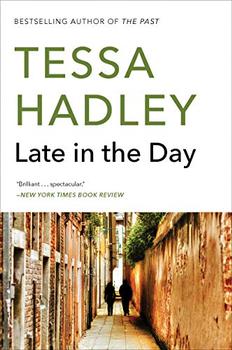Summary | Excerpt | Reviews | Beyond the book | Read-Alikes | Genres & Themes | Author Bio

The lives of two close-knit couples are irrevocably changed by an untimely death.
Alexandr and Christine and Zachary and Lydia have been friends since they first met in their twenties. Thirty years later, Alex and Christine are spending a leisurely summer's evening at home when they receive a call from a distraught Lydia: she is at the hospital. Zach is dead.
In the wake of this profound loss, the three friends find themselves unmoored; all agree that Zach, with his generous, grounded spirit, was the irreplaceable one they couldn't afford to lose. Inconsolable, Lydia moves in with Alex and Christine. But instead of loss bringing them closer, the three of them find over the following months that it warps their relationships, as old entanglements and grievances rise from the past, and love and sorrow give way to anger and bitterness.
Late in the Day explores the complex webs at the center of our most intimate relationships, to expose how, beneath the seemingly dependable arrangements we make for our lives, lie infinite alternate configurations. Ingeniously moving between past and present and through the intricacies of her characters' thoughts and interactions, Tessa Hadley once again "crystallizes the atmosphere of ordinary life in prose somehow miraculous and natural" (Washington Post).
All four of these characters are vividly realized and remarkably complex; over the course of the novel their backstories work in tandem with their present-day thoughts and choices to gel into a clear picture...continued
Full Review
(618 words)
This review is available to non-members for a limited time. For full access,
become a member today.
(Reviewed by Lisa Butts).
 Many writers, artists, and other creatives experience the occasional block – an inability to create or a sudden lack of ideas for moving forward with their work. Both Alex and Christine deal with this issue in Tessa Hadley's Late in the Day, and for Alex the block spans many years. The term creative block was coined in 1947 by Dr. Edmund Bergler, an Austrian psychiatrist and disciple of Sigmund Freud. He described the condition as a person's "unconscious wish to defeat one's conscious aims, and to enjoy that self-constructed defeat." There is something to this definition, but not every creative block is the result of inadvertent self-sabotage.
Many writers, artists, and other creatives experience the occasional block – an inability to create or a sudden lack of ideas for moving forward with their work. Both Alex and Christine deal with this issue in Tessa Hadley's Late in the Day, and for Alex the block spans many years. The term creative block was coined in 1947 by Dr. Edmund Bergler, an Austrian psychiatrist and disciple of Sigmund Freud. He described the condition as a person's "unconscious wish to defeat one's conscious aims, and to enjoy that self-constructed defeat." There is something to this definition, but not every creative block is the result of inadvertent self-sabotage.
These blocks are almost always psychological in nature, and perhaps the most common cause...
This "beyond the book" feature is available to non-members for a limited time. Join today for full access.

If you liked Late in the Day, try these:

by Roxana Robinson
Published 2025
What risks would you be willing to take to fall in love again?

by Anne Tyler
Published 2025
A new Anne Tyler novel destined to be an instant classic: a socially awkward mother of the bride navigates the days before and after her daughter's wedding.